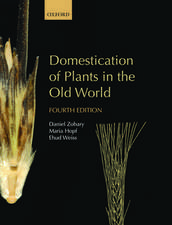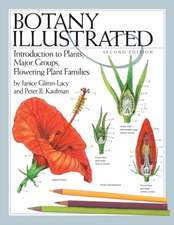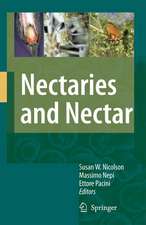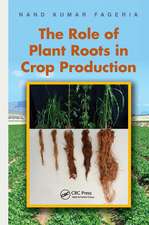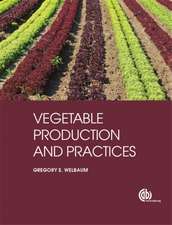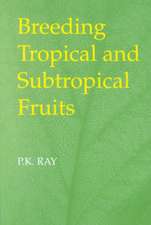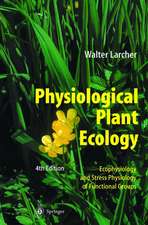Solanaceae and Convolvulaceae: Secondary Metabolites: Biosynthesis, Chemotaxonomy, Biological and Economic Significance (A Handbook)
Autor Eckart Eichen Limba Engleză Hardback – 17 dec 2007
| Toate formatele și edițiile | Preț | Express |
|---|---|---|
| Paperback (1) | 1941.44 lei 6-8 săpt. | |
| Springer Berlin, Heidelberg – noi 2014 | 1941.44 lei 6-8 săpt. | |
| Hardback (1) | 2114.60 lei 6-8 săpt. | |
| Springer Berlin, Heidelberg – 17 dec 2007 | 2114.60 lei 6-8 săpt. |
Preț: 2114.60 lei
Preț vechi: 2578.77 lei
-18% Nou
Puncte Express: 3172
Preț estimativ în valută:
404.76€ • 439.80$ • 340.22£
404.76€ • 439.80$ • 340.22£
Carte tipărită la comandă
Livrare economică 21 aprilie-05 mai
Preluare comenzi: 021 569.72.76
Specificații
ISBN-13: 9783540745402
ISBN-10: 3540745408
Pagini: 652
Ilustrații: XIV, 637 p.
Dimensiuni: 155 x 235 x 40 mm
Greutate: 1.18 kg
Ediția:2008
Editura: Springer Berlin, Heidelberg
Colecția Springer
Locul publicării:Berlin, Heidelberg, Germany
ISBN-10: 3540745408
Pagini: 652
Ilustrații: XIV, 637 p.
Dimensiuni: 155 x 235 x 40 mm
Greutate: 1.18 kg
Ediția:2008
Editura: Springer Berlin, Heidelberg
Colecția Springer
Locul publicării:Berlin, Heidelberg, Germany
Public țintă
ResearchDescriere
1. 1 Philosophy and Aims of this Book 1. 1. 1 The Large Solanales Families as a Topic Solanales are from the Mid-Cretaceous (stem node age: 106 my; crown node age: 100 my) (Bremer et al. 2004). Solanaceae and Convolvulaceae are sisters represe- ing the two large families of this order. Their last common ancestor lived about 70 my ago (Durbin et al. 2000). The main objective of the author is to focus on aspects of our extensive knowledge of secondary metabolites in the plant kingdom in order to account for the specific competitiveness and productivity of these two large Solanales families. To this end, it has been necessary to take a bird’s-eye view of 200 years of phytochemical research on the Solanales, since first scientific reports with regard to both families were published in the early nineteenth century. Due to an almost complete lack of phytochemical reports (one single exception) on species of the three remaining, very small families of the order (see Chap. 2), they have not been considered. 1. 1. 2 General Role of the Secondary Metabolism for a Specific Characterization and Classification of Plant Taxa While traditional systematics generally focused on morphologic-anatomical char- ters of plants, in some cases chemotaxonomic aspects with regard to low molecular secondary metabolites were also considered. However, plant biochemistry and chemotaxonomy normally played a minor role in classification.
Cuprins
Classification and System in Solanales.- Ornithine-Derived Alkaloids.- Tryptophan-derived Alkaloids.- Miscellaneous Alkaloids.- Phenylalanine-derived Metabolites/Phenylpropanoids.- Terpenoids (Isoprenoids).- Secondary Metabolites Derived from Fatty Acids and Carbohydrates.
Recenzii
From the reviews:
"The text covers the known chemistry of two large families and compares the findings in a variety of ways to provide a synthesis … . At the end is an Appendix of colour plates, Subject Index, and Taxonomic Index. … I recommend this book to anyone involved with people, whether city-dwellers or traditional. While the book contains plants not often used by humans, these families have species that are ubiquitous as food and medicine." (Daniel F. Austin, Economic Botany, Vol. 62 (4), 2008)
"This handbook ... survey of two centuries of research on secondary metabolites in the Solanaceae and Convolvulaceae families, both of the order Solanales. The author has more than 20 years of research experience on secondary metabolites of these taxa. … the author treads a new path using more recent chemotaxonomic and molecular phylogenetic aspects for the characterization of plants. … this book will clearly serve as a reference for scientists active in the field of medical plant research, natural products chemistry and pharmaceutical sciences." (Ivo Pischel, Journal of Ethnopharmacology, March, 2009)
“The handbook Solanaceae and Convolvulaceae secondary metabolites comprises 8 chapters and an appendix with 83 color plates of Solanales species. … Most of the references listed at the end of each Chapter provide additional sources for the reader. This book is recommended to anyone interested in studying secondary metabolites.” (Edna Myiake Kato, Brazilian Journal of Pharmaceutical Sciences, 2010)
"The text covers the known chemistry of two large families and compares the findings in a variety of ways to provide a synthesis … . At the end is an Appendix of colour plates, Subject Index, and Taxonomic Index. … I recommend this book to anyone involved with people, whether city-dwellers or traditional. While the book contains plants not often used by humans, these families have species that are ubiquitous as food and medicine." (Daniel F. Austin, Economic Botany, Vol. 62 (4), 2008)
"This handbook ... survey of two centuries of research on secondary metabolites in the Solanaceae and Convolvulaceae families, both of the order Solanales. The author has more than 20 years of research experience on secondary metabolites of these taxa. … the author treads a new path using more recent chemotaxonomic and molecular phylogenetic aspects for the characterization of plants. … this book will clearly serve as a reference for scientists active in the field of medical plant research, natural products chemistry and pharmaceutical sciences." (Ivo Pischel, Journal of Ethnopharmacology, March, 2009)
“The handbook Solanaceae and Convolvulaceae secondary metabolites comprises 8 chapters and an appendix with 83 color plates of Solanales species. … Most of the references listed at the end of each Chapter provide additional sources for the reader. This book is recommended to anyone interested in studying secondary metabolites.” (Edna Myiake Kato, Brazilian Journal of Pharmaceutical Sciences, 2010)
Caracteristici
With 16 beautiful color plates showing Solanales plants
The author, Prof. Eckart Eich, has over 20 years experience in research of secondary metabolites of Solanales
A comprehsive handbook which for the first time covers all aspects of these plant families, which include many species of great pharmacological and economic importance
Includes supplementary material: sn.pub/extras
The author, Prof. Eckart Eich, has over 20 years experience in research of secondary metabolites of Solanales
A comprehsive handbook which for the first time covers all aspects of these plant families, which include many species of great pharmacological and economic importance
Includes supplementary material: sn.pub/extras

